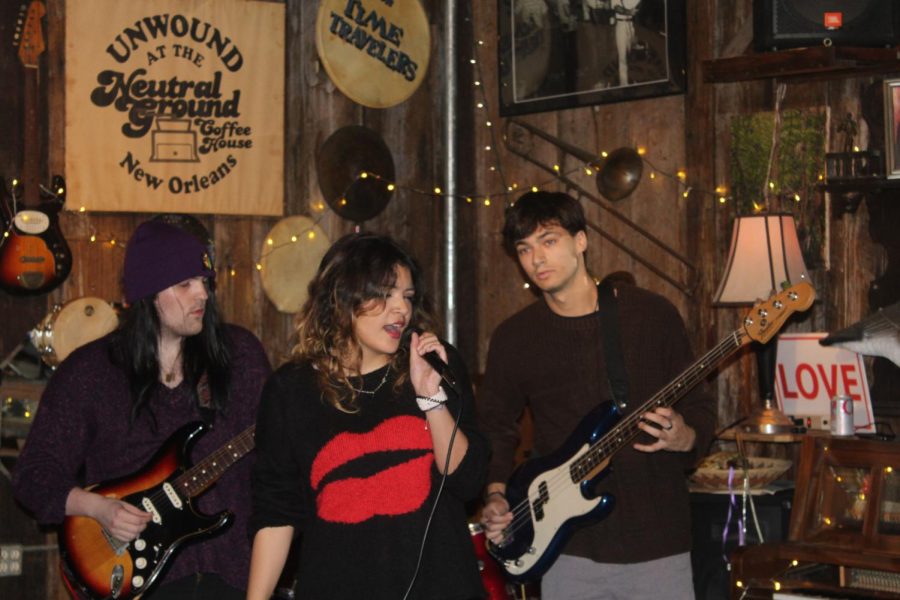Tulane’s music scene is trying to leave the Doghaus
Brody Smith (left), Sofia Cassanova (middle), and Andrew Tannenbaum (right) perform at Neutral Ground Coffee House. She uses Loyola’s music resources in a band comprised of Tulane and Loyola students. Courtesty of Brody Smith
March 2, 2023
When Tulane business major Brody Smith decided to put a band together, he didn’t realize how difficult it would be to recruit musicians from Tulane. He decided to distribute fliers and conduct interviews, but only one member that’s in the band now even responded to the poster.
Smith said that since you don’t see many bands and musicians coming out of Tulane, the music scene feels almost like a wasteland, especially if your music style is anything near alternative rock.
“Putting up these posters made me realize I never should have went to Tulane,” Smith said. “If you don’t want to be in, like, a Grateful Dead cover band basically, there’s not much room.”
While Loyola and Tulane are often seen as sister schools, and many students have access to each campus’ resources, Smith said it feels like the universities’ music communities are entirely separate.
“Freret Street is what, maybe 20 feet across. But in reality, it’s more like the Grand Canyon,” Smith said. “I mean, as soon as you cross the street and head to Loyola, it’s a whole different world.”
Smith’s band, Doghaus, consists of two other Tulane students and one Loyola student, a music industry studies junior Sofia Casanova.
“Aside from her singing and writing ability, even just being able to have Sofia’s connections at Loyola has been huge for us,” he said.
Casanova said that she thought Loyola would be the best fit for her career from the start, and that a music-focused school is what she’s always intended to pursue after participating in choir and taking music lessons growing up.
“I knew about Loyola, and I knew how good of a school it was in terms of music, so I wanted to continue that,” she said. “Ultimately, I decided to go to music school because it would be a really good opportunity to meet people and make connections.”
Andrew Tannebaum, Doghaus’ bass player, said it’s been nice to have more than just a Tulane perspective with Casanova in the band.
“Loyola has much more of a focused music scene and has so many resources Tulane does not have,” he said. “It’s just a different culture.”
Tannebaum said it’d been fun to join in on playing more “Loyola-centric” shows and house parties since live music at house parties don’t often happen for Tulane.
“The last show we played was at Neutral Ground, which was more of a Loyola crowd for sure, I didn’t see a single Tulane kid there, which is nice, to be honest,” he said. “It felt more, like, accepting, and they’re known just to enjoy live music versus a crowd that is expecting really high-end music because they don’t get music very often.”
One of the band’s main struggles has been finding a space to practice because of the few studios that Tulane has available. Smith said they are only open to specific music majors on campus.
“We were able to record our first single, ‘Opia,’ at Loyola’s recording studios, and they just put Tulane to shame,” he said. “It’s very hard. We’re kind of struggling through right now, but one of the biggest things we want to do is break out of the Tulane stratosphere and get into the Loyola universe.”
Last semester’s flea market at Loyola was mind-blowing to Smith. The event, hosted by Loyno Costume Shop, featured student artists and their works, along with pop-up vintage shops and live music played by Loyola bands. Smith said that such creative events with live music felt like an alien concept to him.
He added that he didn’t understand why there wasn’t some kind of official length through each university that connected both music departments, claiming that it would benefit both sides.
“Not only would it benefit Tulane bands a lot, but it would benefit Loyola bands because of all the people in the music business over here,” Smith said.
Most clubs and activities held that are music-related at Tulane are student-run, Smith said, so bridging the gap between the schools would help Tulane pull its weight in the college music community.
“There needs to be some kind of connection between the Tulane and Loyola music scenes,” he said. “Tulane’s got the people, but yet there’s no bridge to get them across the river.”








